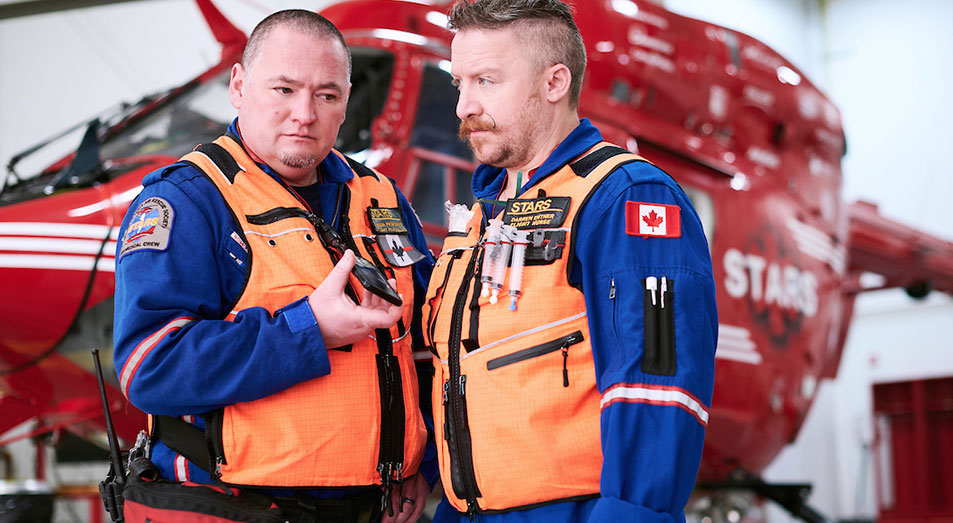
Learning Took Flight at Sask Polytech for STARS Crew
Sask Polytech grads bring critical care skills and team mentality to treating the most critically ill and injured.
“Being there for the next patient in need and knowing you have the skills to help them. That's key,” says Darren Entner, clinical operations manager for STARS ambulance in Regina. With six bases across the Prairies including Regina and Saskatoon, STARS flies an average of eight missions each day, treating the most critically ill and injured patients.
Fellow crew member, Jason Prokopetz, agrees that having the skills to give patients the best possible care is of the utmost importance.
Prokopetz graduated from Saskatchewan Polytechnic’s Advanced Care Paramedic program in 2004 which prepared him for his role at STARS where he has worked for the past 10 years. When they are hired, new crew are put through the STARS Academy at the Calgary base to ensure they have the critical care skills and team mentality needed to do their job. “I didn’t know how competitive we’d be going up against the Alberta paramedics, but we were very competitive,” he recalls. “Sask Polytech builds high quality paramedics that are very strong.”
Prokopetz was part of the inaugural class for the Advanced Care Paramedic program and felt his instructors ensured he and his fellow students were equipped to handle any situation they would encounter in the field. That high quality training and drive for excellence has continued for Prokopetz at Sask Polytech, where he is a casual instructor, teaching ACP students for the past 15 years. “I feel it’s really a way to give back and to help students develop,” he said.
Community training is an important element for Prokopetz in his position as STARS community education lead for Saskatchewan. Through this training, STARS works with emergency personnel in the community to develop landing zones and collaborate on plans and training for emergency events that typically involve a STARS helicopter. The team effort and skills training ensure patient care is the number one priority.
Continuous training is something Entner stresses is important as well. Entner graduated in 2000 from the collaborative nursing program. He then worked in hospital settings as a critical care nurse before joining STARS nine years ago.
“As students we had a lot of great learning opportunities,” he said. “It gave us real world clinical experience and great preparation for our careers.”
In addition to two pilots, each helicopter is equipped as a flying ICU, with two pilots, a critical care flight nurse and an advanced care paramedic on every call.
STARS has a commitment to ongoing training and safety. This is an important aspect of STARS and something both crew members value as self-proclaimed, lifelong learners. Working side by side with top performers in their field is a highlight for Prokopetz who explained that even when working with crew members from other bases, the transition is seamless thanks to quality training and teamwork.
Both Prokopetz and Entner encourage anyone going into the health care field to continue to learn and to remain open to new ideas and opportunities.
“Sask Polytech programs and applied training will open doors for you,” said Prokopetz. “There are a lot of opportunities. As you experience different settings you’ll find where you fit.”
Entner’s advice is similar. “Set a goal and exceed it,” he said. “Never stop learning. I’m over 40 and I get to learn every day.”
Christa MacLean, Sask Polytech dean, Schools of Nursing and Health Sciences is not surprised that grads from these programs have gone on to do great things. “Our Nursing and Health Sciences alumni are on the front lines of health care throughout Saskatchewan and beyond—true heroes, especially during these unprecedented times. Our graduates are in high demand and are grounded in high standards of practice, ethical behaviour, acceptance of diversity and skillful compassion. I commend Darren and Jason for being lifelong learners and leaders in their fields.”
Sask Polytech's nationally recognized Advanced Care Paramedic (ACP) program builds on the Primary Care Paramedic program and positions paramedics for leadership roles in a growing number of settings. Advanced training covers recognizing and managing medical and trauma emergencies, particularly neonatal, pediatric and geriatric. Advanced Care Paramedic - Diploma (saskpolytech.ca)
Sask Polytech offers 16 innovative nursing programs. The school boasts 230 nationally recognized faculty and staff who help prepare students for gratifying careers as registered nurses, nurse practitioners, registered psychiatric nurses, licensed practical nurses and more. School of Nursing (saskpolytech.ca)
June 2022